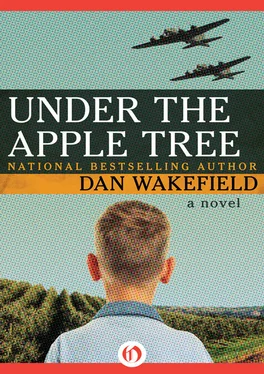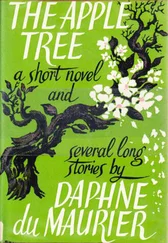“I’m sorry,” he said.
Shirley stubbed out her cigarette on the rock, and stood up. For a second Artie was scared she was going to go off mad and never speak to him again, but all she did was put her hands behind her back and walk around the fire, kicking little rocks and twigs toward it.
“Mother and Dad were hurt real bad once,” she said. “They still hurt. Maybe they always will.”
“You mean ’cause they lost all their money in the Crash?”
Shirley’s cheeks colored; and Artie was afraid she’d get mad again but all she did was pick up a rock and throw it in the creek.
“It wasn’t just losing the money,” she said. “It was losing their friends. Or people they thought were their friends.”
“That sure is crummy all right.”
“Now they don’t trust anyone. They say when it comes right down to it you can only depend on your own family.”
“Is that how you think, too?”
Shirley picked up another rock, tossed it up and caught it, and then instead of throwing it into the creek she just dropped if.
“I hate to think that way. But maybe I do, in my heart.”
Artie felt real sad.
“You don’t trust me , even?”
Shirley smiled, and came back and sat on the rock.
“Sure I do. But you’re almost my own family, or will be anyway, when Roy and I get married.”
“I sure am glad.”
“I must trust you a lot, the way I go on babbling to you.”
“You don’t ‘babble.’ You talk swell.”
“I never could talk to girl friends. I never even had any.”
“But you’re popular! You’re a cheerleader!”
“ Was . Anyway, I think the whole thing was a fluke. I think they were just scared of me because I was different, so when I tried out they chose me. I was different, so they thought I was special.”
“You are special.”
“‘Special’ isn’t always good. I wish I was more like other people, really. Had girl friends and all that.”
Suddenly she laughed, like she’d thought of some terrific joke.
“Maybe that’s why I want to join the WACs,” she said.
“What is?”
“To be like other people. Regular people. Nobody could think I was snooty if I was a WAC. And I’d have lots of girl friends, without even trying. I’d have to. I’d be one of them.”
“I thought you wanted to join so you’d help the War get over.”
“I do. I honestly do. But a person can have more than one reason for doing something. Reasons they didn’t even know about. Or just suspected. I’ve probably got a whole barrel of reasons for wanting to be a WAC.”
“What else?”
Shirley got the pack of Luckies out of her purse again and lit up another one.
“Not the ones people think. I mean, it’s not because of sex or anything. Not the way they think, anyway.”
“What way is it, then?”
“Well, the truth is, a person thinks about sex when they don’t have anything to do but twiddle their thumbs. If I was in the WACs I’d be too busy and tired to think about it all the time.”
“Do you? Think about it all the time?”
“I think about Roy—and—well, about it. With him, of course.”
“Well, that’s normal, I guess.”
“Sometimes I wonder. Sometimes I wonder if something’s wrong with me.”
“What?”
“It’s terrible.”
Shirley looked small and frightened and beautiful, and Artie wished he could go and put his arm around her. He wished he was her actual boyfriend coming home from the War, and he could do it with her. Then he felt guilty as hell for even having such a thought, which was not only sinful but unpatriotic, thinking that way about the girl of a Marine who was also your own brother!
“Sometimes,” Shirley said in a painful whisper, “I think I’m oversexed.”
Artie knew lots of girls worried about being oversexed, especially when their guys were off in the War. It was like a disease that could strike anyone, just like polio, and ruin your life.
Artie took a deep breath, and got up the courage to speak.
“I think I am too,” he said.
Shirley didn’t say anything, but just stared into the fire. Maybe she didn’t even hear what Artie said, absorbed as she was with her own burden.
Artie didn’t bring it up again. He just sat staring into the fire, like Shirley.
The two of them sat transfixed, like witches hexed, watching the licking flames and the hot red glow of the popping embers.
In the crisp clear days of October, America was beautiful, just like in the song. Artie had never been “from sea to shining sea,” nor had he seen “the purple mountain’s majesty” but he knew they were out there, believed in them, and saw every day with his own eyes the beauty of the gentle hills, the creeks and cornfields, the solid old white frame houses and the ancient oaks of Town. He believed, in fact, that God had “shed his grace” on this land, that this grace was tangible, visible, in the arch of rainbows over wet fields, the slant of shed sunlight on the sides of old barns. His pride in his country was sustained by the signs of nature and the symbols of men, not only the bright stars and stripes that flew from public buildings and hung from private porches but the comforting, everyday emblems of home: Bob’s Eats, Joe’s Premium, Mail Pouch Tobacco. This was what Roy and all the other boys were fighting to save, preserve, and protect, along with the people who were lucky enough to live in and of it, and all this was sacred, worthy of any sacrifice, including life itself, for without it, life would be hollow and dumb.
Sometimes home seemed so beautiful and right it was hard to believe the War was really going on out there in the fringes of the world, the bleak foreign battlefields and alien oceans. When Birney beat Geneseo 13–6 Artie felt so good about everything he went to Damon’s after the game to see if the latest magazines had any hopeful news about the War. Leafing through them, though, he found only gloom and frustration. The whole situation was summed up in one blunt headline:
NATION WARNED OF GRIM TRIALS, WITH WORST OF WAR YET TO COME
Yet to come!
If that wasn’t bad enough, some General said in the same article that “our losses may well be so heavy they will be felt in every town and village in the U.S.”
Birney had already lost Wings Watson, and his teammates were strewn around the world now, from Bo Bannerman with the Air Corps in England to Roy with the Marines in the South Pacific.
If the worst was yet to come, Roy himself might be stabbed by some Jap leaping down from a coconut tree in the dead of night, or blown to smithereens by a mortar shell, with only his “remains” shipped home in a box.
Artie felt his knees go watery, and he stuck the magazine back in the rack.
‘Slingin’ Sammy Baugh was crying.
That’s how crummy things were at the start of the New Year of 1944.
The most shocking thing to Artie about the full-page picture in Life of Slingin’ Sammy bawling like a baby was that he wasn’t even crying about the War. The star passing quarterback of the Washington Redskins was crying because his team was getting beat 41–21 by the Monsters of the Midway, the champion Chicago Bears. Artie had seen lots of pictures of grown men crying because their loved ones were going off to battle, or their comrades were getting killed all around them, but this was the first one he’d seen of a he-man crying in the midst of Wartime because his team was losing a football game.
It figured, though. The War had gone on for more than two years now, and people were tired of it. They wanted something else to get worked up about, even if it was losing a football game.
Читать дальше












